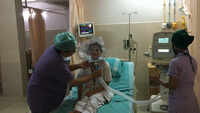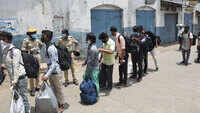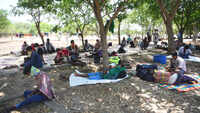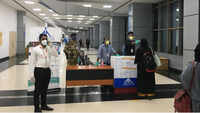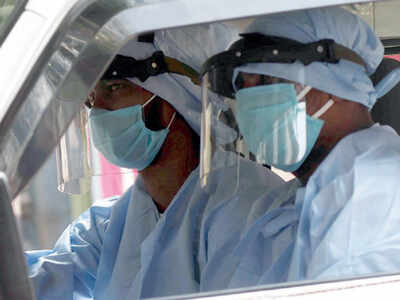
BENGALURU: Karnataka’s efforts to slow the spread of coronavirus have ensured that healthcare systems are not overwhelmed with cases. This is evident from the low bed occupancy in dedicated Covid-19 hospitals. Ninety-eight per cent of the beds earmarked for coronavirus patients across the state are vacant.
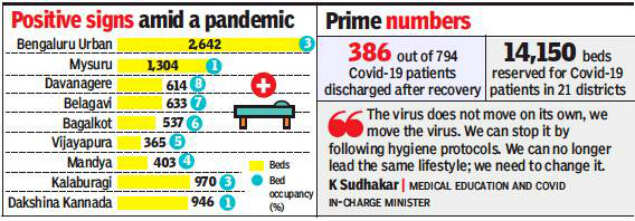
The government reserved 14,150 beds in 21 districts when it started implementing a contingency plan two months ago. An analysis by the Karnataka Covid-19 War Room, led by IAS officer Munish Moudgil, shows that the bed occupancy rate, as on May 8, in these districts just 2 per cent.
A spike in the number of infections in the past three days has pushed up anxiety levels in Karnataka, which just reopened its economy. But the war room data is perhaps an indicator that the crisis is still under control.
Bed occupancy is one of the parameters that determine how the healthcare system is holding up in challenging times, according to senior health department official. “Unlike in other states and countries, there is no struggle to find a bed in Karnataka. This can be attributed to the state government’s decision to ramp up health infrastructure on time by reserving more beds, and also to its success in containing the spread of virus,” the official added.
In Bengaluru, 2,462 beds have been reserved for Covid-19 patients, but the bed occupancy rate is only 3 per cent. The highest bed occupancy is in Davanagere district — 8 per cent. The district has witnessed a spurt in cases this week. Belagavi is next with 7 per cent occupancy followed by and Bagalkot, 6 per cent. In four districts, the bed-occupancy rate is zero as the patients were discharged after making full recovery.
“Low bed occupancy reiterates that we are on the right track with regard to measures being taken to contain the spread of coronavirus. Identifying and reserving more beds for patients was a part of the contingency plan that was put in place earlier,” medical education minister K Sudhakar, who is in the core government team overseeing Karnataka’s Covid-19 response, told STOI. “There has been no absolute spike or community spread so far and the scramble for beds has not happened here.”
According to Sudhakar, 386 of the state’s 794 Covid-19 patients had recovered and were back home. “Their beds have been released back into the system,” he added. In Mumbai, in contrast, Covid-19 patients were reportedly waited for hours to get a hospital bed. “We are not lowering our guard. By May end we will have 60,000 beds. But going forward, everything depends on how the people behave. If people do not maintain social distancing, wear masks, follow hygiene protocols, it is going to be tough,” Sudhakar said.

The government reserved 14,150 beds in 21 districts when it started implementing a contingency plan two months ago. An analysis by the Karnataka Covid-19 War Room, led by IAS officer Munish Moudgil, shows that the bed occupancy rate, as on May 8, in these districts just 2 per cent.
A spike in the number of infections in the past three days has pushed up anxiety levels in Karnataka, which just reopened its economy. But the war room data is perhaps an indicator that the crisis is still under control.
Bed occupancy is one of the parameters that determine how the healthcare system is holding up in challenging times, according to senior health department official. “Unlike in other states and countries, there is no struggle to find a bed in Karnataka. This can be attributed to the state government’s decision to ramp up health infrastructure on time by reserving more beds, and also to its success in containing the spread of virus,” the official added.
In Bengaluru, 2,462 beds have been reserved for Covid-19 patients, but the bed occupancy rate is only 3 per cent. The highest bed occupancy is in Davanagere district — 8 per cent. The district has witnessed a spurt in cases this week. Belagavi is next with 7 per cent occupancy followed by and Bagalkot, 6 per cent. In four districts, the bed-occupancy rate is zero as the patients were discharged after making full recovery.
“Low bed occupancy reiterates that we are on the right track with regard to measures being taken to contain the spread of coronavirus. Identifying and reserving more beds for patients was a part of the contingency plan that was put in place earlier,” medical education minister K Sudhakar, who is in the core government team overseeing Karnataka’s Covid-19 response, told STOI. “There has been no absolute spike or community spread so far and the scramble for beds has not happened here.”
According to Sudhakar, 386 of the state’s 794 Covid-19 patients had recovered and were back home. “Their beds have been released back into the system,” he added. In Mumbai, in contrast, Covid-19 patients were reportedly waited for hours to get a hospital bed. “We are not lowering our guard. By May end we will have 60,000 beds. But going forward, everything depends on how the people behave. If people do not maintain social distancing, wear masks, follow hygiene protocols, it is going to be tough,” Sudhakar said.
Get the app

